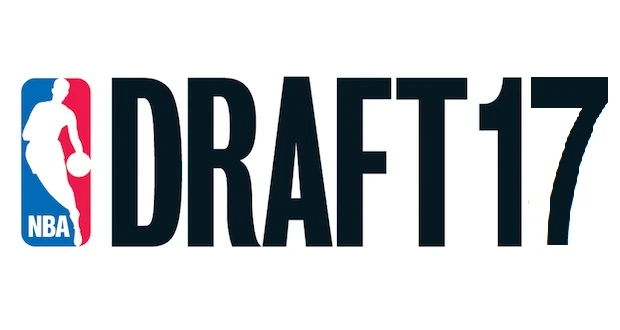With the NBA Draft taking place tomorrow, here are some nuggets about the festivities taking place at the Barclays Center:
There are 73 early entry candidates in this year's edition, 63 from the NCAA and 10 based overseas who did not take the American college route.
The Philadelphia 76ers pulled off a trade earlier this week with the Boston Celtics for the top overall pick in the upcoming draft, sending the third overall pick and a future first round pick to move up a couple of spots. This would be the second year in a row (and fourth time ever for the franchise) that they are picking first. Expected to be Markelle Fultz, he would follow Ben Simmons of LSU (2016), Allen Iverson of Georgetown (1996), and Doug Collins of Illinois State (1973) as Sixers top overall selections.
By agreeing to the deal, the Celtics are the first team to trade the top overall pick before or during the NBA Draft since the Orlando Magic sending the draft rights to Chris Webber to the Golden State Warriors for the draft rights to Penny Hardaway and three future first round picks in 1993. Like the current deal, the Orlando-Golden State trade involved the first and third overall selections. Had they kept the pick, Boston would have made their first overall draft pick selection for the first time in the common era of the NBA Draft, which started in 1966. They also would have been the first team to pick first and own the conference's best record since 1982, when the Lakers drafted James Worthy of North Carolina first overall after toting the Western Conference's best record. The Celtics will now be drafting third overall in back-to-back seasons, following Jaylen Brown of California, who had been the team's first top-three selection since 1997.
The Los Angeles Lakers were rewarded with the second overall pick for the third straight season, with the last selections being D'Angelo Russell of Ohio State (2015) and Brandon Ingram of Duke (2016). Before this stretch, the last time the team picked this high was the Worthy selection. Expected to be Lonzo Ball, the UCLA freshman would be the sixth Laker lottery selection, following Russell, Ingram, Eddie Jones of Temple (1994), Andrew Bynum of St. Joseph High School (2005), and Julius Randle of Kentucky (2014).
The Phoenix Suns are once again drafting fourth overall for the second straight season, with Dragan Bender of Croatia being last year's selection. Before last year, the Suns last picked this high back in 1975 when they selected Alvan Adams fourth overall. Adams would be named as the Rookie of the Year by the end of the season.
The Sacramento Kings are the only team with two lottery selections in the 2017 NBA Draft, picking fifth and tenth overall. Both draft slots are as a result of trades, with the fifth overall pick coming out of a deal with Philadelphia involving Nik Stauskas, while the tenth overall overall pick coming out of the deal with New Orleans involving DeMarcus Cousins.
The Dallas Mavericks are drafting ninth overall, their first top-ten selection since 1998. That season, the picked Robert Traylor of Michigan sixth overall, but engineered a deal with the Milwaukee Bucks for the ninth overall pick, a German sweet-shooting forward named Dirk Nowitzki.
The Era of the One-And-Done continues, with a record 14 draft picks in last year's draft playing just one year of college ball. This year looks to be no different, with the bumper crop including Fultz, Kentucky's Bam Adebayo, De'Aaron Fox, and Malik Monk, UCLA's Ball, Ike Anigbogu, and TJ Leaf, Duke's Harry Giles and Jayson Tatum, Texas' Jarrett Allen, Gonzaga's Zach Collins, Florida State's Jonathan Isaac, Kansas' Josh Jackson, Arizona's Lauri Markkanen, Creighton's Justin Patton, and NC State's Dennis Smith, Jr., among others.
Notable international prospects include Isaiah Hartenstein (Zalgiris), Jonathan Jeanne (Nancy), Frank Ntilikina (Strasbourg), Anzejs Pasecniks (Gran Canaria). There were a record 27 international players selected last year, surpassing the original record of 21 back in 2003.
Looking for the next Manu Ginobili or Draymond Green? The second round could be a source of some gems for a team willing to conduct due diligence. 36th overall selection Malcolm Brogdon of Virginia is a Rookie of the Year finalist in the upcoming NBA Awards for averaging 10.2 points and 4.2 assists. One pick later, Patrick McCaw started three games for the newly-minted champions. Last year's second round haul also included Los Angeles Lakers backup big man Ivica Zubac (32nd), Phoenix Suns jitterbug Tyler Ulis (34th), and Chicago Bulls forward Paul Zipser (49th).
The top overall selection does not really guarantee that much success. Since the establishment of the NBA Draft Lottery in 1985, only four top overall selections have won a NBA title with the team that drafted them. The San Antonio Spurs' dynamic duo of David Robinson (1987) and Tim Duncan (1997), and the Cleveland Cavaliers' LeBron James (2003) and Kyrie Irving (2011).
The last fifteen NBA Drafts has featured a second-generation NBA player being selected. The 2016 edition saw Lithuanian legend Arvydas Sabonis' son Domantas being selected by the Orlando Magic 11th overall before being packaged as part of the trade involving the Oklahoma City Thunder and Serge Ibaka.
With the advent of the NBA Development League, now called the NBA Gatorade League (G-League), there is a growing inclination from teams to assign their younger players to their respective affiliates to help with the development. 39 draftees were given a D-League assignment, including 17 first round picks. The last eight draft classes have produced at least 200 draft picks who went through the D-League.
The current two-round draft started in 1989. It used to be that the draft would only end if all teams passed, much like what the current PBA Draft is being conducted. The 1974 NBA Draft instituted a 10-round NBA Draft, which was reduced to seven in 1985, and then three in 1988.

No comments:
Post a Comment